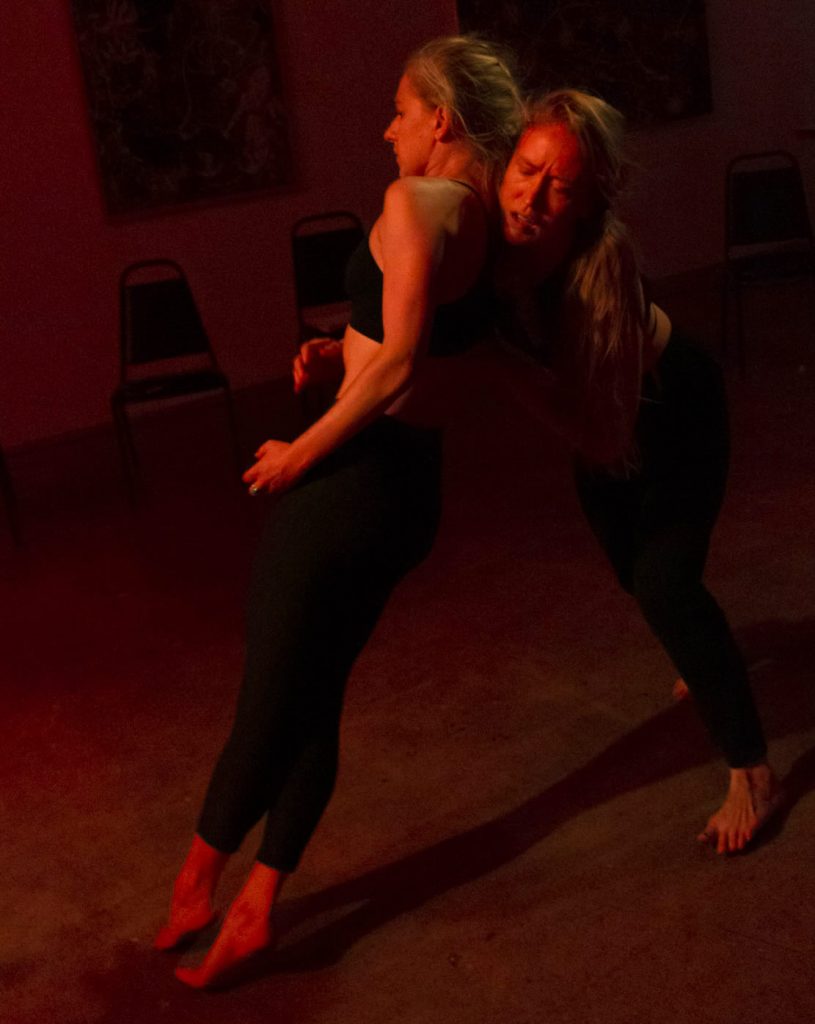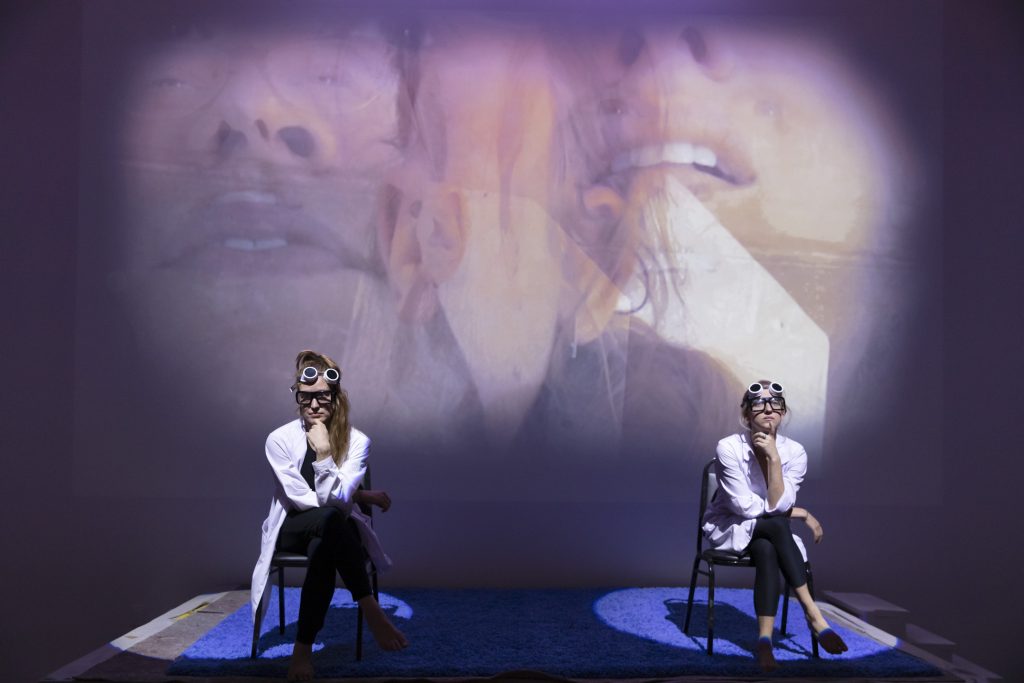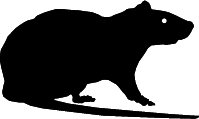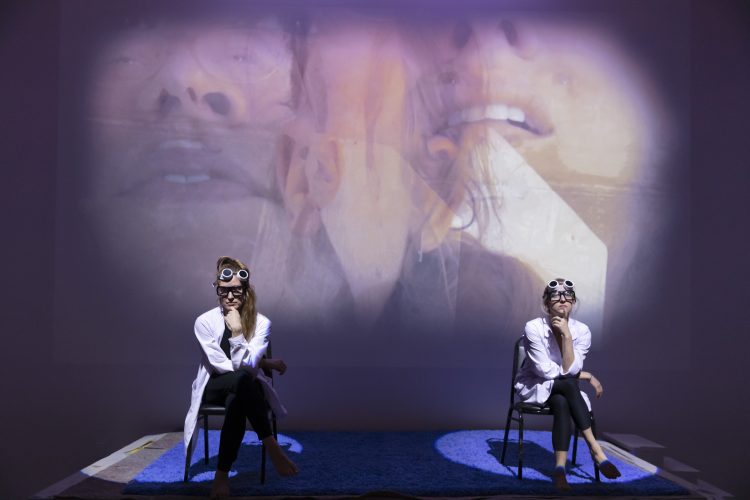Who better to review a play about two headbutting artists than two headbutting critics? Max Raab and Kirill Antonin Zakharov talk cookies, sadomasochism, and the ontological argument in their joint review of Crushing Baby Animals, an immersive theatre piece running at The Plaxall Gallery in Long Island City, Queens through July 21.
Max: The problem with this painting is that it seeks the beautiful in the ugly. One should seek the ugly in the ugly.
Kirill: I disagree. But we are here to review the play, not the Summer Salon.
Max: The Salon is part of it, no? Or else why perform in a gallery? They clearly used some of the artworks. The physical theatre against that sculpture with outstretched arms. Or that blackened wall of boobies.
Kirill: (consulting his notes) Lost Bronze Sculpture by Emil Silberman and Muted Landscape by Zhen Guo.
Max: My titles are better.
Kirill: I especially enjoyed how they used Apparatus by Alberto Bursztyn as a sort of Duchampian mechanism to illustrate consciousness.
Max: The installation with the flasks and colored fluids? Too literal.

Kirill: As usual you dive straight in with opinions. We have to give an idea of what went on. A summary. How would you describe it?
Max: We were looking at a photograph of a flooded playground when an actress…
Kirill: Tana Sirois.
Max: …rushes in and starts arranging bottles. She swears and pretends not to see us. Then a second actress…
Kirill: Maria Swisher.
Max: Joins her and out they go through that door. Then two people in animal masks lead us to a hallway filled with fog where there is techno music and a recorded voice saying something about Dante’s Inferno…
Kirill: This is a treatment, not a summary. Allow me. (Clears throat) Crushing Baby Animals follows Tana and Maria as they rehearse a staging of Dante’s Inferno under the watchful eye of their antagonistic doppelgangers, the White Coats, also played by themselves. The audience moves through the rooms of the spacious gallery to witness scenes, some live, some recorded, some both. Games are played, dreams analyzed, mushrooms eaten, wormholes to parallel universes entered. All this in act one. Act two adds another layer of meta-narrative by exploring possible outcomes as Tana and Maria try to write and produce a play called Crushing Baby Animals, which, how should I say, is inspired by a shared nightmare and seemingly about them trying to produce Dante’s Inferno.
Max: There was also something about environmentalism. Melting polar ice caps as a symbol for something or other. And they kept calling us art-eaters, which I liked, though personally I am more of an art-vomiter. Also I had high hopes for the cookies they served.
Kirill: This is why you ate so many? You laughed a lot, I noticed.
Max: Sometimes at, sometimes with. Some parts were better than other parts. And there were many parts. Over 30 I think. Most of them announced with an ironic title card à la Brecht and a sci-fi sound effect. Estrangement is good, but this device became repetitive. Conventions, once established, should be broken.
Kirill: I agree, which is why I was relieved when the second half introduced a new structure. The cabaret sequence was delightful, the musical number even more so. Tana and Maria are two very talented performers with an exceptionally broad range, from naturalism to parody, from musical to physical theatre.
Max: Yeah, and it’s clever how they showcase this range in the frame of an ironic commentary. As if to say: musical theatre is commercial, yeah, but look how well I sing and dance. And the scene towards the end where Tana talks as Maria crawls around in impossible ways…
Kirill: “To get into her body.” (Laughs) Yes, that worked well. Even better was the scene in Act I where Maria was trying to do exercises and Tana kept interrupting. But my favorite was when they play “the game,” which I guess is where Maria makes Tana ask her painful questions until one of them has a breakdown. It shows the difference in their acting styles. Tana wants to perform; Maria wants to suffer.
Max: That’s what you took from it? For me it was more about the sadomasochistic nature of their collaboration.

Kirill: That, too. That narrative thread, of the two actors working together on material that is far too personal, that was my favorite. It reminded me sometimes of Opening Night by Cassavetes.
Max: Here you betray your love of actors and your secret wish to become one. I found that part funny at times, self-indulgent at others.
Kirill: But always self-aware.
Max: There is a limit to how much meta-criticism can be built into a play to protect against criticism. At some point it becomes disingenuous, and the critic must address the content, not the meta-commentary on the content.
Kirill: What is the content? What is the play about?
Max: Hmm… good question. I wonder if they know. Not crushing baby animals. Definitely not the environment. If anything, I think it is about impotence. About the futility of trying to create a masterpiece that embraces all reality, even multiple realities.
Kirill: Now that’s interesting. One of the characters, I forget who, even says something to that effect towards the end. Which would explain why the whole thing grows out of an attempt to stage The Inferno. Dante’s poem is a work that spans the whole cosmos.
Max: Yes, and theirs is such an attempt, but a failed one, as they freely admit. The thing is impossible today. Reality is fragmentary, consciousness an illusion, and so on. The digression into psychology is basically a doctor’s note excusing their inability to do the job. The digression into philosophy serves to prove that the job is logically impossible to do.
Kirill: Yet a coherent, all-embracing view of the universe is possible, as Dante’s example shows. Ah… now I think I see why they brought in the multiverse. Are you familiar with the ontological argument?
Max: Isn’t that one of your failed attempts to prove the existence of God?
Kirill: Anselm of Canterbury’s, actually. The argument runs that the idea of a perfect being necessarily includes existence.
Max: So…

Kirill: So the idea of a perfect play also necessary includes existence. Tana and Maria are idealists in search of the perfect play, which actually exists, somewhere in the multiverse. The question is which door to take. Crushing Baby Animals is not about impotence at all. It’s about feeling lost. As Dante says, “I found myself within a forest dark, for the straightfoward pathway had been lost.” It’s about needing guidance and finding it in each other.
Max: Or in an inflatable rodent you crush with too much love.
Kirill: Exactly.
Max: As usual, you manage to drag in God, your favorite sublimation. Did you enjoy the play?
Kirill: Thoroughly. In fact, the more I think about it, the more I enjoyed it. Plays are like that. Digestion is the best part. While movies too often are like junk food. How about you? Would you recommend it?
Max: There is so much energy, so much youth and life in this play, so many bright ideas still in their infancy that to criticize it harshly would be like crushing baby animals. So yes, I would recommend it. And the Summer Salon, too, for that matter. This folded sweater made of clay by Adriano Baruffi intrigues me. The level of detail in the collar. Why on Earth would anyone…

